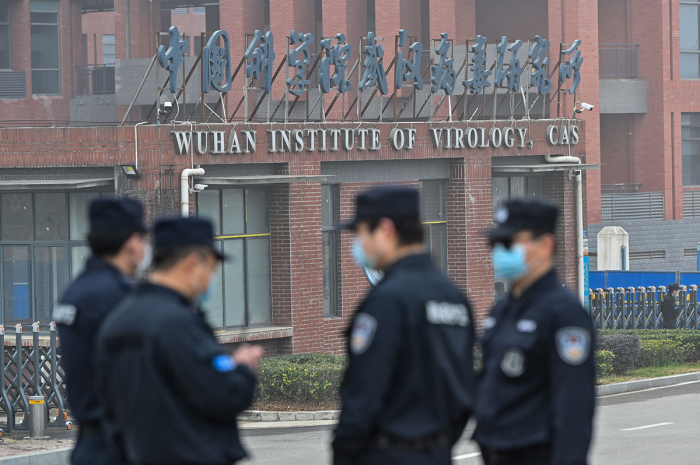NIH admits US taxpayer dollars funded gain-of-function research at Wuhan lab

A top congressional Republican is asking for answers after the National Institutes of Health appears to have admitted that contrary to multiple previous assertions, United States taxpayer dollars were used to fund gain-of-function research that could have caused the coronavirus.
Lawrence Tabak, the principal deputy director of the National Institutes of Health, said in a letter to Rep. James Comer, R-Ky., the ranking member of the House Oversight Committee, that the organization’s grant to EcoHealth Alliance funded a “limited experiment” at the Wuhan Institute of Virology in Wuhan, China, where the coronavirus is believed to have escaped from. Still, Tabak denied that any of the coronaviruses studied using NIH grants became COVID-19.
????????????
— Oversight Committee Republicans (@GOPoversight) October 20, 2021
July 28th NIH says “no NIAID funding was approved for Gain of Function research at the WIV.”
Obviously, they were lied to.
NIH confirmed today EcoHealth and the WIV conducted GOF research on bat coronaviruses.
@PeterDaszak with EcoHealth hid it from the USG. pic.twitter.com/Ou3ZLKto0L
“The limited experiment described in the final progress report provided by EcoHealth Alliance was testing if spike proteins from naturally occurring bat coronaviruses circulating in China were capable of binding to the human ACE2 receptor in a mouse model,” Tabak wrote. He stressed that “All other aspects of the mice, including the immune system, remained unchanged.”
Tabak maintained that although “laboratory mice infected with the SHC014 WIV1 bat coronavirus became sicker than those infected with the WIV1 bat coronavirus,” that was merely an “unexpected result of the research, as opposed to something the researchers set out to do.”
“EcoHealth failed to report this finding right away, as was required by the terms of the grant. EcoHealth is being notified that they have five days today to submit to NIH any and all unpublished data from the experiments and work conducted under this award,” he added.
In response to Wednesday’s letter, Comer crafted a letter to NIH Director Francis Collins, said “It is still too soon to say that COVID-19 did not originate in the WIV with U.S. taxpayer dollars.” He added that some of the statements made in the Oct. 20 letter contradict the assurances made by Collins in a July 28 letter to the Committee.
????BREAKING????
— Oversight Committee Republicans (@GOPoversight) October 21, 2021
We know:
EcoHealth & Wuhan lab conducted gain-of-function research with taxpayer $$$.
EcoHealth concealed data showing they worked on coronaviruses in Wuhan.
Director Collins and Dr. Fauci misled Americans about this cover up. @NIH must brief Congress NOW.???? pic.twitter.com/cACSl4g14o
Specifically, Collins reported that “Results of the WIV experiments under the EcoHealth Alliance grant were reported to [the National Institute of Allergy and Infectious Diseases] and published contemporaneously in peer-reviewed scientific literature to inform the global scientific community of these findings.”
He also mentioned a “requirement that if any of the chimeric viruses generated under this grant showed evidence of enhanced virus growth greater than ten times that of the original virus from which they were created, the grantee must immediately stop all experiments with these viruses and provide NIAID and the WIV Institutional Biosafety Committee with the relevant data and information related to these unanticipated outcomes.”
Comer told Collins that based on Tabak’s admission that EcoHealth Alliance failed to abide by the terms of the grant, NIH must answer “whether or not at the time of the July 28, 2021, response to the Committee, it knew of EcoHealth’s failure to properly and promptly report all of its scientific findings.”
“The fact that EcoHealth submitted its most recent progress report for the grant period ending May 31, 2019, on Aug. 3, 2021, suggests NIH knew, at the time of its letter to the committee, that EcoHealth had not been forthright with the U.S. government,” Comer added.
Comer concluded the letter by requesting that Collins brief members of the House Oversight Committee as soon as possible. The NIH, as well as its subagency NIAID, have faced questions for months about whether taxpayer dollars funded gain-of-function research at the Wuhan Institute of Virology.
At a May 11 hearing, Sen. Rand Paul, R-Ky., described gain-of-function research as “juicing up naturally occurring animal viruses to infect humans.” He pressed Dr. Anthony Fauci, the head of NIAID who has become the public face of the U.S. government’s response to the coronavirus pandemic, if he supported the funding of gain-of-function research at the Wuhan lab.
“The NIH has not ever and does not now fund gain-of-function research in the Wuhan Institute of Virology,” Fauci asserted. At a July 20 hearing, Paul informed Fauci that Dr. Richard Ebright, a molecular biologist from Rutgers University, concluded that the research conducted in Wuhan “matches, indeed epitomizes, the definition of gain-of-function research.”
When Paul asked Fauci if he wanted to amend his May 11 remarks in light of Ebright’s testimony and the fact that lying to Congress constitutes a crime, the epidemiologist declined: “I have never lied before the Congress and I do not retract that statement.”
In an appearance on “Fox News Primetime” Thursday, Paul pushed back on the idea that “it was unexpected that it gained function.” The senator asked: “How do you know if it’s unexpected or not? it’s unknown.”
“If you take a virus from a cave, you combine it with a virus that has a 50 percent mortality, it either is going to be more transmissible or less but you don’t know in advance whether it’s going to be worse or better,” he added. “So when it gains function, that is something that actually is expected. Some of these viruses are going to gain function and then the possibility of leaking out, I think, is a horrific thing for mankind.”
As of Friday afternoon, the coronavirus pandemic is estimated to have contributed to the deaths of nearly 5 million people worldwide, including more than 750,000 Americans.
Ryan Foley is a reporter for The Christian Post. He can be reached at: ryan.foley@christianpost.com




























